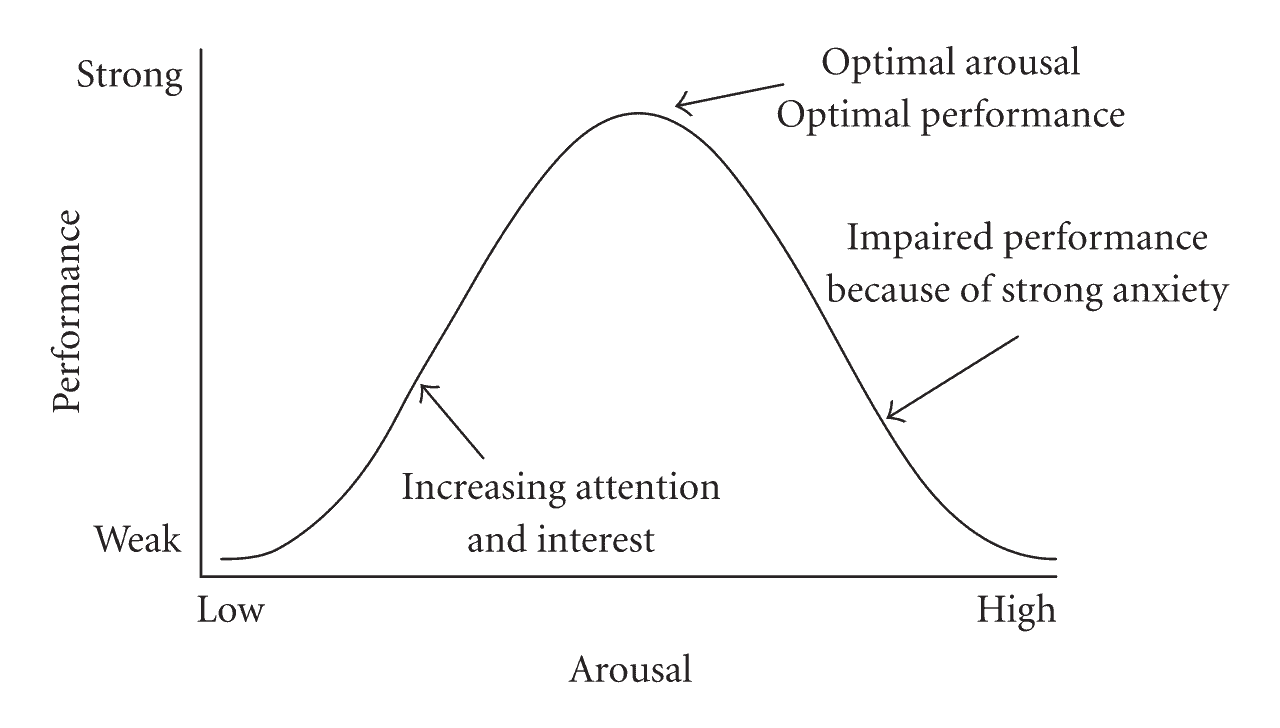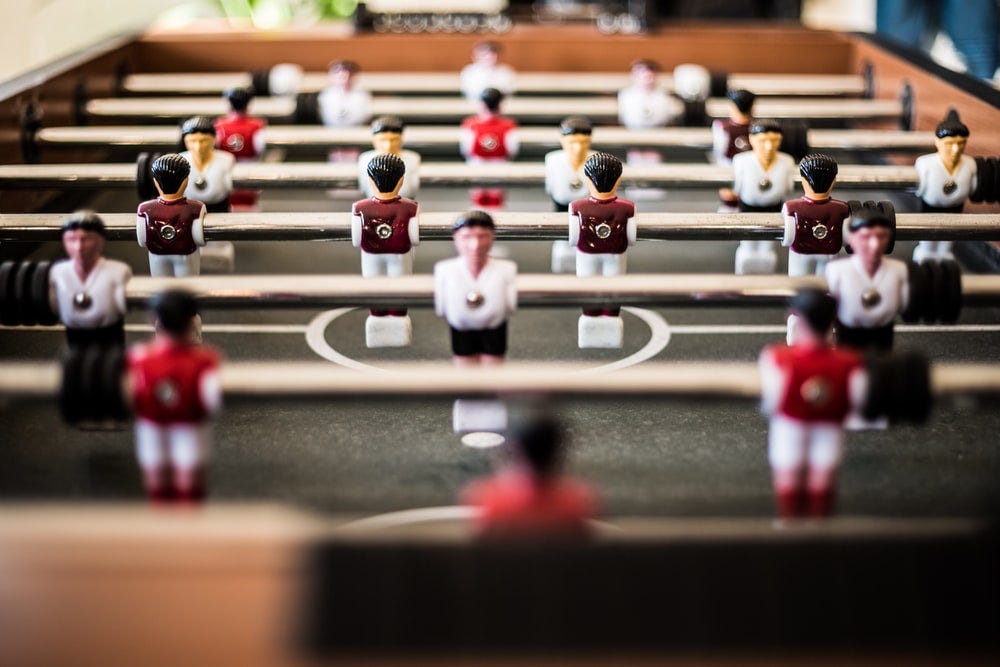Zones of Optimal Functioning
Hardware and Software - Individual and Shared Zones of Optimal Functioning
Hello Everyone,
For the past two years, every time I have had a role as a mental performance consultant with a team or an individual, I seem to default to the analogy of the brain as hardware and the mind as software. I share this image with the people I work with for them to better understand the idea that they are capable of updating their Operating Systems (Mind) through mental skill development. A side note, this idea vibrated through my headphones as I was listening to a podcast titled Finding Mastery hosted by Micheal Gervais, PhD who is a performance psychologist for the Seattle Seahawks.
Continuing with this concept, I usually share something along the lines of, imagine your brain being the smartphone in your pocket and on that smartphone you have various types of applications. Every so often, you receive a notification that asks whether you'd like to update your applications. A primary reason why applications update is for them to perform optimally than they have previously. Similarly, once a performer utilizes various mental skills and puts in the work to implement them, their "mental applications" are also going through an update, just like the applications on your phone.
Side note: I don't actually believe that our brains work like computers, but you can read more about that in my final remarks sections.
However, it also must be understood that this is not an overnight process. It takes time, just like someone would go to the gym to get stronger. You wouldn't step up to the rack and attempt to squat 225 pounds if you haven't squatted in over a year. To begin, you would start simple, using just barbell to make sure your form and posture is correct before you begin stacking plates on either side. This exact process can be translated to the use of mental skills in your life. Think of your mind as a muscle, getting stronger with each repetition you do. This inevitably will require you to get uncomfortable, just like a physical muscle needs to tear in order to regenerate and rebuild for it to get stronger. Furthermore, when you are working on the mental side of the game, often times our minds rather take the path of least resistance. This is the space where world class performers separate themselves from the rest. At the end of the day it comes down to who is willing to put in the work towards updating their operating system.
Wouldn't you want to have the capacity to have your mind be an asset rather than a liability?
Well, that's exactly where performance psychology comes into play. That's where this newsletter will become handy for you. All Performance Psych Musings publications will include concepts, skills, and/or ideas that I have found helpful for performers I have worked with or I have found through research. Not only that, but I will provide you with evidence-based approaches. So, whatever I will be sharing with you will have a foundation in science. In this edition, allow me to share with you my musings on Zones of Optimal Functioning.
Musings
I will be sharing with you two theories that are foundationally similar, but 40+ years apart. The theories are Individual Zones of Optimal Functioning and Shared Zones of Optimal Functioning.
Individual Zones of Optimal Functioning
I want you to think back to a time you have performed at your best, in whatever domain that may have been in. With that image in your minds eye, how did you feel leading up to that performance? What were some emotions that you felt before you began? I ask this because this is the foundation of Individual Zones of Optimal Functioning or IZOF.
The main premise of IZOF suggests that there are individual differences in the way people respond to anxiety. The IZOF model proposes that every individual performer can be successful when their pre-performance arousal is within or near their optimal zone. This reveals the idea that performers of all types, regardless of your professional field, can either become successful when their anxiety is low, while others may succeed when anxiety is high.
In order for an individual to figure out what level of arousal works for them, I believe it is essential for a performer to develop the skill of self-awareness. This will allow the individual to accurately recall and anticipate their pre-performance arousal levels, which will grant them the opportunity to prepare in a way that caused them to succeed in the past. This in turn begs the question, what emotional state do you have to be in in order to be in the zone? What will it take for you to land at the top for an optimal performance experience of your own?
However, this is only the tip of the iceberg. Wouldn't it be great that once you figure out your ideal level of arousal you would perform at your best consistently? Unfortunately, we are much more complex than that. Not only do your emotions and your level of arousal influence your performance, but just like an onion, there are many layers one needs to peel off to fully grasp the whole picture. A group of researchers in Italy and Finland decided to begin navigating through such complexity.
Claudio Robazza PhD and his colleagues examined the IZOF model and came up with measures that can be used as a valid and reliable tool for performers. You may be wondering, how do you go about measuring an individuals pre-performance arousal, let alone a performers overall experience of their performance surrounding their arousal level. The researchers collected the data using self report scales. Their approach included a psychobiosocial perspective. Meaning, that they not only measured arousal levels, but included the performer’s whole lived experience, including biological and social variables. They came up with eight areas that they believed surrounded successful and unsuccessful performances. These variables fell into three buckets:
1. Psychological - affective, cognitive, motivational, and volitional.
2. Biological - bodily-somatic and motor behavioral.
3. Social - operational and communicative.
Imagine being able to measure all of these and finding out exactly what makes you perform optimally. They didn't just examine a generic baseline of each one of these areas, but they inquired about the intensity, frequency, and the perceived impact. They approached it from not only various angles, but also provided depth to each of the variables that were measured. Unfortunately, I haven't come across a study following the one in 2016 that actually used the measures these researchers used to measure IZOF with varying performance populations. Definitely a direction future research can take.
If you know of such research, feel free to let me know and share.
To briefly conclude IZOF, I'm wondering if you can take this information and apply it into your own life. What areas of your psychobiosocial makeup needs to be altered as you prepare yourself for your performance?
Shared Zones of Optimal Functioning
Now, I want you to imagine a time when you were a part of a team where you felt as if the whole squad was performing optimally. Not just you, but each individual on your team was in the zone. Everyone knew what they needed to do in order to succeed in the end. This is where Shared Zones of Optimal Functioning comes into play or SZOF.
SZOF has been introduced in the scientific literature in 2020 by Edson Filho, PhD. The idea of SZOF was sparked by examining IZOF and a concept called Shared Mental Models. The marrying of these two concepts birthed the new framework of SZOF. Just as the original author mentioned in his paper, the IZOF model examines concepts of I and me, as for SZOF, it reflects we and us ideas.
"This differentiation is important because team performances and processes are emergent states insofar that they emerge from the team as a whole rather than from any single individual, akin to the gestalt notion that 'the whole is greater than the sum of its parts'" (Filho, 2020, p. 4)
I must say, I'm a huge fan of group dynamics, and I find the process of what it takes to create a cohesive team fascinating. I plan on doing some group dynamics research myself during my PhD studies starting this fall. Maybe that's why I love the SZOF idea and am excited to see what type of research will be done with it. However, I digress.
Just to clarify SZOF further, one must understand what a team is. I believe the easiest way to define a team is, two or more individuals who are unified by common goal(s). That does not mean that they will meet their goals and be successful. In order for a team to be successful and perform at its best capacity, each member must hold various types of knowledge that is shared with everyone on the team. This is where Shared Mental Models or SMM come in. If a team has a strong SMMs, individuals on the team know-what, know-why, know-where, know-when, and know-how regarding what must be done for optimal performance. This is not an exhaustive list, but this may look like everyone being on the same page, everyone knowing their role and how they are expected to execute it, if one player falters a teammate will pick up for them and know what is expected, team-wide expectations have been set and each individual follows them (on and off the field), and if someone steps out of line teammates keep them accountable. There also may be the idea of setting expectations for performing in the areas of physical, technical, tactical, and mental aspects of a team.
Therefore, the linking of SMM with IZOF has allowed Filho to explore how best to measure such variables. The SZOF approach plans to measure four concepts around the optimal zones of functioning when it comes to teams:
1. Psychobiosocial states that underpin optimal performance across the whole team.
2. Fluctuations in performance over time.
3. Synchrony during a performance (antecedent and duration)
4. Dynamics around leadership over time, allowing observation in who leads and who follows within a team.
What's exciting about SZOF is the fact that there are so many avenues to explore when it comes to optimal performance of teams. I believe that the group dynamics literature may become impacted by SZOF moving into the future. Furthermore, it would be great to see some intervention-based research so that other individuals can replicate it and ultimately facilitate their own team-based SZOF approaches.
Any ideas come to mind as to how you can can impact your teams Shared Zone of Optimal Functioning? Feel free to comment below.
Final Remarks
I wanted to touch back about my hardware and software analogy. I do not believe in the idea that our minds are computers, frankly, they are more complex than that. I use the analogy for the purpose to support a better understanding of how performance psychology can benefit a performer. If you were to ask what I do believe in, when it comes to our brains and how they really work, I would say I align with Tecumseh Fitch's (2014) work around cognitive biology:
“Neurons are living cells - complex self-modifying arrangements of living matter - while silicone transistors are etched and fixed. This means that applying "software/hardware" distinction to the nervous system is misleading. The fact that neurons change their form, and that such change is at the heart of learning and plasticity, makes the term "neural hardware" particularly inappropriate. The mind is not a program running on the hardware of the brain. The mind is constituted by the ever changing living tissues of the brain, made up of a class of complex cells, each one different in ways that matter, and that are specialized to process information.”
To conclude, I have decided that as I close each newsletter I will share with you some media that I have been consuming myself if anyone is looking for some recommendations. Along with references that support the article. Check them out below.
What I’m Reading:
So far in March:
Owning Your Own Shadow: Understanding the Dark Side of the Psych By Robert A. Johnson. Find it on Amazon.
An Unquiet Mind: A Memoir of Moods and Madness By Kay Redfield Jamison. Find it on Amazon.
February:
I'm Still Here: Black Dignity in a World Made for Whiteness By Austin Channing Brown. Find it on Amazon.
Why Fish Don't Exist: A Story of Loss, Love, and the Hidden Order of Life By Lulu Miller. Find it on Amazon.
Think Like a Rocket Scientist: Simple Strategies You Can Use to Make Giant Leaps in Work and Life By Ozan Varol. Find it on Amazon.
What I’m Listening to:
- Tools for Managing Stress & Anxiety - Huberman Lab Podcast #10
- This episode explains what stress is, and how it recruits our brain and body to react in specific ways. I describe the three main types of stress, and how two of them actually enhance the function of our immune system making us less vulnerable to infections. I review tools that allow us to control our stress in real time, as well as tools to prevent long term stress, burnout and stress-induced illness and anxiety. As always, we cover behavioral tools and supplements that can assist or hinder stress control.
- Harry Lewis and Stephen Blackwood: What's an Education For?
- Stephen Blackwood speaks with Harry Lewis, legendary Professor of Computer Science at Harvard University (where he taught both Bill Gates and Mark Zuckerberg). They discuss the tragic limits of narrowly vocational approaches to education—with which many young people are pressured to conform—by contrast with education that fosters true self-reflection and a meaningful life. They also discuss cancel culture, college admissions, and freedom of speech.
References:
Here are a few references based on what I shared. If you are interested in reading these or would like more recommended readings, feel free to reach out.
Filho, E. (2020). Shared Zones of Optimal Functioning: A Framework to Capture Peak Performance, Momentum, Psycho–Bio–Social Synchrony, and Leader–Follower Dynamics in Teams. Journal of Clinical Sport Psychology, 14(4), 330-358. https://doi.org/10.1123/jcsp.2019-0054
Filho, E., & Tenenbaum, G. (2020). Team Mental Models: Theory, Empirical Evidence, and Applied Implications. In G. Tenenbaum & R. C. Eklund, Handbook of Sport Psychology (4th ed., pp. 611-631). John Wiley & Sons, Inc. https://doi.org/10.1002/9781119568124.ch29
Fitch, W. T. (2014). Toward a computational framework for cognitive biology: unifying approaches from cognitive neuroscience and comparative cognition. Physics of life reviews, 11(3), 329-364. http://dx.doi.org/10.1016/j.plrev.2014.04.005
Kamata, A., Tenenbaum, G., & Hanin, Y. L. (2002). Individual zone of optimal functioning (IZOF): A probabilistic estimation. Journal of Sport and Exercise Psychology, 24(2), 189-208. https://doi.org/10.1123/jsep.24.2.189
Prapavessis, H., & Grove, J. R. (1991). Precompetitive emotions and shooting performance: The mental health and zone of optimal function models. _The sport psychologist, 5(3), 223-234. https://doi.org/10.1123/tsp.5.3.223
Robazza, C., Bertollo, M., Ruiz, M. C., & Bortoli, L. (2016). Measuring Psychobiosocial States in Sport: Initial Validation of a Trait Measure. PLOS ONE, 11(12), e0167448. https://sci-hub.se/10.1371/journal.pone.0167448
Ruiz, M. C., Hanin, Y., & Robazza, C. (2016). Assessment of Performance-Related Experiences: An Individualized Approach. The Sport Psychologist, 30(3), 201–218. https://sci-hub.se/10.1123/tsp.2015-0035






Thanks for sharing your musings on your love of group dynamics. This was a really good share! And thanks for sharing what you've been reading and watching. Gotta check that podcast out.
Really enjoyed reading this Piotr! Probably the best quality blog post I’ve read in a very long time. Well researched and beautifully presented. Good luck with your PhD this fall!